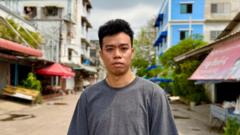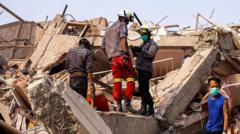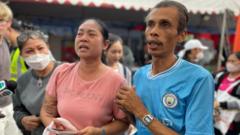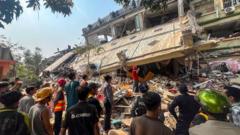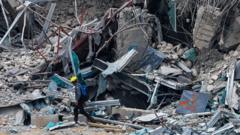Despite a plea for international help in the aftermath of a devastating earthquake, Myanmar's political isolation poses significant challenges to the delivery of aid.
Myanmar's Earthquake: A Call for Aid Amidst Political Turmoil

Myanmar's Earthquake: A Call for Aid Amidst Political Turmoil
The recent earthquake in Myanmar exacerbates the location's ongoing humanitarian crisis and is hampered by its complex political landscape.
Myanmar's precarious situation has deepened with the recent earthquake that struck on Friday, leading to urgent calls for humanitarian assistance from its military-led government. The spokesperson, Gen. Zaw Min Tun, has notably appealed to the global community to extend aid while promising cooperation to ensure victims receive the necessary help.
Myanmar has faced increasing isolation since the military coup in 2021, which resulted in a series of harsh crackdowns and strained relations with Western nations. Since then, the country has been under international sanctions, although these include provisions for humanitarian assistance. The United Nations confirmed on Friday that it would mobilize resources to support those affected.
However, the logistics of delivering aid in a nation embroiled in civil conflict pose significant challenges. Michael Martin, a nonresident fellow at the Center for Strategic and International Studies, emphasized concerns regarding the safety of international aid workers, who may have difficulty accessing the most affected areas. Compounding these issues, there's a risk that military forces might obstruct aid attempts, either by blocking entry to rebel-held territories or manipulating the distribution process to appear as though the aid originated from military efforts rather than international organizations.
Furthermore, bureaucratic hurdles, such as visa delays for relief workers, could further complicate the urgent need for assistance. This situation underscores the difficulty of providing critical aid to populations in crisis within a politically unstable environment.
Myanmar has faced increasing isolation since the military coup in 2021, which resulted in a series of harsh crackdowns and strained relations with Western nations. Since then, the country has been under international sanctions, although these include provisions for humanitarian assistance. The United Nations confirmed on Friday that it would mobilize resources to support those affected.
However, the logistics of delivering aid in a nation embroiled in civil conflict pose significant challenges. Michael Martin, a nonresident fellow at the Center for Strategic and International Studies, emphasized concerns regarding the safety of international aid workers, who may have difficulty accessing the most affected areas. Compounding these issues, there's a risk that military forces might obstruct aid attempts, either by blocking entry to rebel-held territories or manipulating the distribution process to appear as though the aid originated from military efforts rather than international organizations.
Furthermore, bureaucratic hurdles, such as visa delays for relief workers, could further complicate the urgent need for assistance. This situation underscores the difficulty of providing critical aid to populations in crisis within a politically unstable environment.



